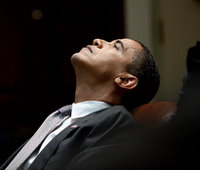It is very likely that come the end of November, after a busy month traveling to Asia and Europe, President Barack Obama will have emerged with few decisive victories to burnish his image after the "shellacking" he took in the midterm elections. Instead, Obama and his team will have to adjust to some hard realities. Though the new Congress will not be seated until January 2011, we are already seeing changes in the political climate in Washington that will test the administration's ability to show, both to Americans and to other governments, that the executive branch is still in the driver's seat when it comes to setting U.S. foreign-policy priorities.
As Dimitri Trenin observed in charting the likely demise of the New START treaty, "Partisanship in Washington has reached a new level, infecting not just longstanding domestic policy disputes, but also foreign policy and national security issues." There will be no Vanderbergian moment for the president over the next two years. Josh Rogin quotes an anonymous Republican Capitol Hill staffer as declaring, "You are going to see more aggressiveness to push an agenda and not to defer to the administration." Even in areas where we can expect some agreement between congressional Republicans and the White House, such as passing the free trade agreement for Colombia, the GOP will do everything in its power to prevent Obama from claiming any sort of success for his administration.
All of this will cause other governments to think twice about dealing with a president who cannot speak on behalf of a true foreign-policy consensus on U.S. national interests. Dan Drezner, looking at the potential fallout from a rejection of the New START treaty as well as the administration's inability to close the U.S.-Korea free trade deal with Seoul, concludes that these incidents are "highlighting the massive transaction costs involved with trying to negotiate any hard law arrangement with the United States."

